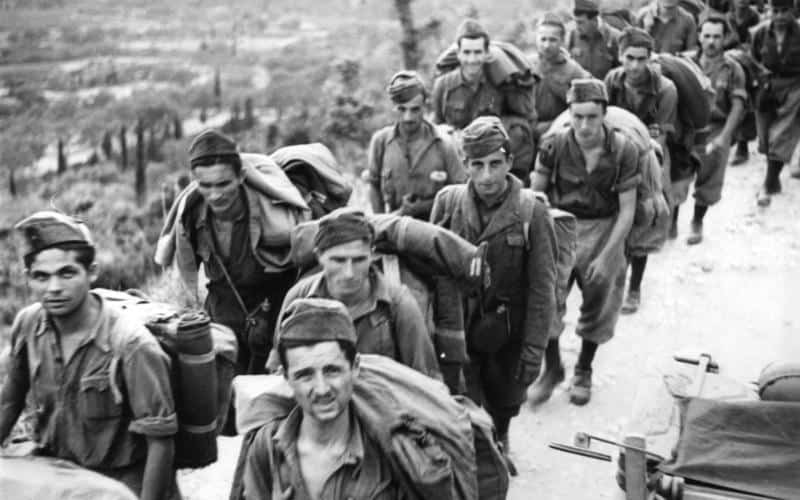
Italian soldiers being taken prisoner by the Germans in Corfu, September 1943. For more details on World War II in Italy, click this link.
By: Phil Kohn. Dedicated to the memory of his father, GM3 Walter Kohn, U.S. Navy Armed Guard, USNR, and all men and women who have answered the country’s call in time of need. Phil can be contacted at ww2remembered@yahoo.com.
Now back in northern Italy, Benito Mussolini on September 24 announces the establishment of the Italian Social Republic, with himself as head of state and prime minister. Although il Duce declares Venice as the capital, his office and other government bureaus are in the small town of Salò, on Lake Garda in Lombardy, midway between Milan and Venice. The “Republic” cedes direct control of some of its northern areas to Germany. The Salò Republic, as the German puppet state is often called, relies on the Nazis for funding. In Papua New Guinea, Australian troops capture the airport at Finschhafen, 60 miles east of Lae.
On the Eastern Front, the Red Army takes Smolensk, Russia, an important city west of Moscow, on September 25. Other elements of the Red Army reach the outskirts of Kiev, the capital of Ukraine. The German High Command issues orders for the removal from military service of any person who has two Jewish, or otherwise non-Aryan, grandparents.
Maj. Herbert Kappler, the SS officer in charge of German-occupied Rome, delivers an ultimatum on September 26 to the city’s Jewish community: Deliver 220 pounds of gold and 110 million Italian lire to SS headquarters within 36 hours or face deportation to concentration camps. Upon an appeal for help from Israel Zolli, Rome’s chief rabbi, Pope Pius XII orders the Vatican treasury to provide the remainder of gold needed to meet the ransom demand. In South America, the U.S. Navy establishes a base of operations at Natal, Brazil.
The second of two heavy air raids against Wewak, Papua-New Guinea, is conducted on September 27 by the 5th USAAF, with 64 Japanese planes and seven ships destroyed. Over 100 Japanese planes had been destroyed during the first attack, in the previous month. In the Solomons, the Japanese begin withdrawing from Kolombangara. In Europe, elements of the British Eighth Army capture Foggia, in southern Italy, and its surrounding airfields without resistance. This puts Allied pilots within range of southern Germany, Poland and the Balkans.
September 28 marks the second day of the so-called “Four Days of Naples.” Residents — angered and frustrated by continual, heavy, devastating Allied bombing raids over their German-held city and anticipating the approach of the Allies — rise against their occupiers. The uprising — by members of the Italian Resistance along with ordinary citizens — results in fierce fighting. Some 170 Resistance members die, along with up to 560 civilians, versus 55-95 Germans killed. The Wehrmacht was withdrawing from Naples anyway, but the uprising hastens the retreat and prevents the Germans from posting a rearguard defense against the Allies, who arrive on October 1. In Occupied Denmark, Georg Duckwitz, a German diplomat, secretly warns Danish Resistance leaders of an SS order to shortly begin arresting and deporting the kingdom’s Jews. Over the next weeks, Danes assist most of the country’s 8,000 Jews in eluding arrest; Danish fishermen ferry over 7,200 Jews and some 800 non-Jewish family members to neutral Sweden, where they are given safe haven in an arrangement made by Duckwitz with the Swedish government.
In Italy, the Allies take Pompeii, between Salerno and Naples, on September 29. Aboard the British battleship HMS Nelson in the Grand Harbour of Valletta, Malta, Italy’s prime minister, Marshal Pietro Badoglio, and U.S. Gen. Dwight Eisenhower, Allied commander of the Mediterranean Theater of Operations, secretly meet for the signing of a full and final armistice between Italy and the Allies. The two also discuss war plans.
Sumner Welles, friend and confidante of President Franklin D. Roosevelt, resigns abruptly as Undersecretary of State on September 30. Officially, the reason given is policy differences between Welles and Secretary of State Cordell Hull over relations with pro-Axis governments in Latin America. The actual reason is the threat by former ambassador (to the Soviet Union and to France) William Bullitt — who hungers for Welles’s job — to expose Welles’s homosexuality. FDR never forgives Bullitt, banning him from holding any further government post and even refusing him permission to seek a commission in the U.S. Army. (Bullitt ends up joining the Free French forces under de Gaulle.) On the Eastern Front, the Red Army has pushed the Germans back to the Dniepr River and has established five bridgeheads across the river in its push westward.



